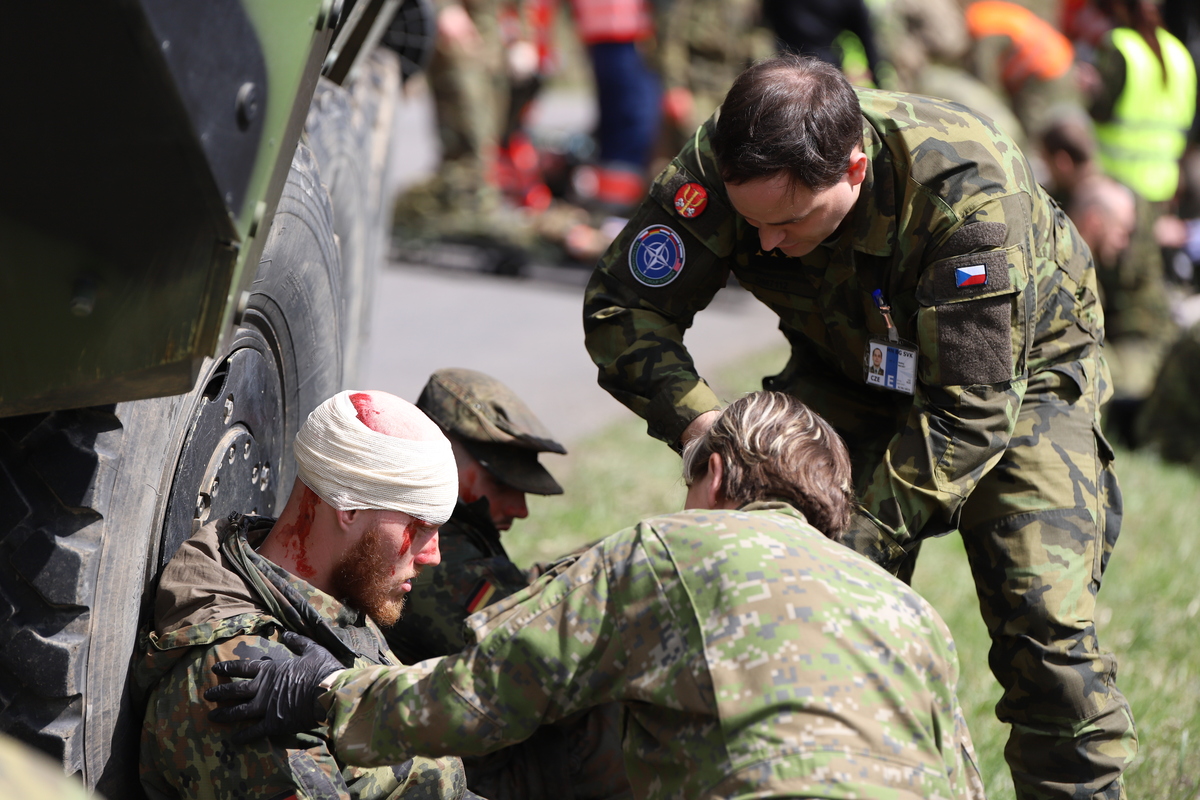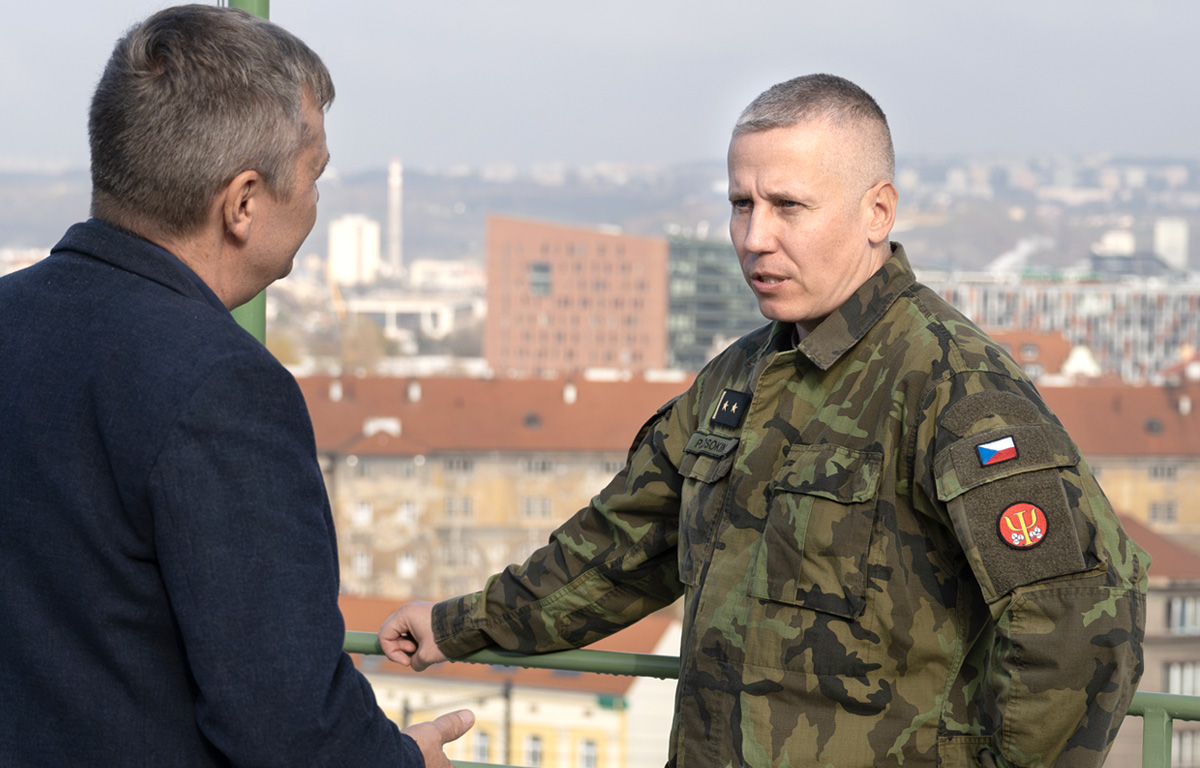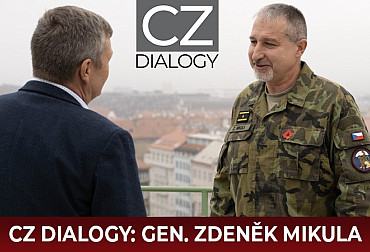Colonel Petr Osokin: Military psychologists participate in various courses and exercises of soldiers on a daily basis
Military psychology is a field that deals with the conditions of soldier training, interpersonal relationships in the military, the study of resilience to stress in conditions of war and the behaviour of troops, including their psychological impact on the civilian population. The Operational Psychology Department (OOpP) of the Military Health Agency was established on 1 July 2013 to ensure the provision of psychosocial care to all members of the Ministry of Defence. Thus, military psychologists can be found in almost every unit of our army. Currently, this department is headed by Lieutenant Colonel Petr Osokin, who was a guest on the next episode of our discussion show CZ DIALOGUES.
Video: Interview with Chief of the Operational Psychology Department Colonel Petr Osokin / CZ DEFENCE
The Department of Operational Psychology is the most numerous part of military psychology precisely because of its presence in the units of the Czech Armed Forces.Psychologists can also be found today in military hospitals, where they are involved, for example, in the selection of recruits before entering the army or in psychodiagnostics. Another of their activities is the preparation of soldiers prior to departure for foreign operations. The Military Police, Special Forces and the University of Defence also have their own military psychologists.
The psychologists of the Department of Military Psychology give advisory opinions and in some cases even have the right of veto. This applies when the psychodiagnosis of the applicant does not correspond to the requirements for a particular position. Clinical psychologists have a veto right, for example, in the selection of candidates for service in the army or in preparation before foreign operations. "In the last few years, the overall approach in health care has been a bio-psycho-social-spiritual one. That is, we take a holistic view. I think psychology is definitely an integral part of military health care or troop training," Col. Osokin says in the beginning of the interview.
According to Osokin, the development of military psychology over the past 30 years has also been influenced by the Czech Republic's entry into the North Atlantic Treaty Organization. "We can share experiences and knowledge. We have learned a lot of things, we have improved some things, and we also pass everything on to our coalition partners. In this respect, the shift will definitely be noticeable because we are constantly learning," the military psychologist said.
Military psychologists in the Operational Psychology Department are professional soldiers and we were interested in what they have to accomplish as part of their expertise. "Of course, they have to complete all-military training like any soldier - shooting, grenade throwing, leading out into space and so on. In terms of training, there are certain parameters set for what every military psychologist should have as a basic package of skills and knowledge. Because even a graduate of a five-year master's degree in psychology has to further his education. Just to mention it in passing, one of the essential courses is a course in complex crisis intervention, so that a military psychologist can deal with difficult situations and really be able to help people. Of course, psychologists gain further experience through practice," Colonel Osokin outlines the training process.
He said every military psychologist should specialize and choose their courses and educational processes accordingly. "If you're thinking about pursuing military psychology seriously in the Operational Psychology Division, there are a few basic things you need to accomplish. You must meet all the prerequisites for the profession of professional soldier. Then, to be a psychologist, you must complete a five-year, single-subject master's degree in psychology and, as I mentioned earlier, you must then undergo continuing education in the form of courses and other activities," the Chief of the Operational Psychology Branch describes the process.
"When a psychologist gets to a unit, knowing the focus and capabilities of that unit is very important. It's one of the key things to get a relationship with that unit because each one has a little bit different specifics. It's going to be different with the Air Force, different with mechanized infantry or logisticians or signalmen. Psychologists then find out the specifics during the course of service and learn to work with that. "It's good for knowing what the relationships are like, what the atmosphere is like in the unit. It's different than when a complete stranger comes in. Sometimes it's also good to meet fellow psychologists from other units. Although there are some differences, people's psyche is still the same, it's just that the paths to it lead down different alleys," says Colonel Osokin, who believes that a certain distance can help an expert to make a more objective assessment of the problem.
In any case, psychology has become an integral part of soldiers' training, and therefore contact with a psychologist does not mean that a soldier has any problems with psychological stability. "Psychologists are involved in various courses and exercises on a daily basis, so soldiers use the services of military psychologists quite routinely," Osokin explains, adding that both the individual and the entire unit are important to their work. The basic goal is the functional unit, i.e. the unit. "But the functional unit consists of individuals. So it is again an inseparable part. It's like in school, where you're trying to learn a substance, but sometimes it happens that some individuals need a more individual approach. So you work in groups and individually. It always depends on the specific needs," says the military psychologist.

The work of a military psychologist is often compared to the work of clergy, i.e. military chaplains, and we were interested in the extent to which their work intersects. "I do think that in certain places the work can meet. On the other hand, if we are concerned about some good psychological adjustment of the soldiers, it is important to distinguish that chaplains, in simple terms, choose the spiritual path and we deal with it in a psychological or professional way, which is based on scientific knowledge. It is then up to each soldier which path he chooses," explains Colonel Osokin.
For example, a certain barrier to communication between soldiers and psychologists may be the fear of the difference between so-called confidentiality and psychological expertise, which could affect a soldier's future career. This concern, however, is refuted by Osokin. "This is such a myth. We psychologists have mandatory confidentiality, we have it embedded in psychological ethics. The only exception is the legal norm of the Czech Republic, where every citizen is obliged to report, for example, that someone has committed a crime or is planning to commit one. But otherwise, of course, we also have confidentiality. And as for endangering a soldier's career, the decisive opinion would be made by clinical psychologists in military hospitals anyway, not by us. They would then do a comprehensive psychodiagnosis with the soldier in question, conduct interviews and so on. It's certainly not as if someone disliked the psychologist and he threatened to end his career," says the military psychologist.
A special chapter of the work of a military psychologist is the preparation and participation of soldiers in foreign missions, where Colonel Osokin has personal experience from the mission in Afghanistan. In these cases, the basis is not only psychological resilience and readiness for military, combat situations, but also for long-term separation from loved ones. "These are things we deal with in preparation for foreign operations. The training is set up to make people more resilient. I liken it a lot to sports psychology, where the load should be distributed adequately and there should be some recovery. Like when you go to the gym. I'll start at lower weights, give myself a good recovery, a good diet, and that's how I'll improve gradually. And it's the same with increasing mental toughness. Of course, there's also theory involved. That's why there are theoretical lectures. On the other hand, we have found over the years that it is very useful to do them interactively, to intersperse them with exercises, so that it makes sense to people. This is the most effective way," Colonel Osokin describes the preparation. However, the best preparation can never ensure a 100% effect. "We can have a person at the peak of his strength, resilient, but then some event happens in his life that affects him so much that, despite the good stock of mechanisms and strategies that have always enabled him to cope with the crisis so far, the crisis exceeds that level," admits the Chief of the Operational Psychology Department.
Apart from the soldiers, there is also much speculation about the emotional qualities and psychological resilience of the entire society. According to Colonel Osokin, the theory that the current generation is worse than the last one or "ours" is as old as humanity itself. "It is important to tell ourselves that we are now in a society that lives in relative prosperity. We have had several decades here without any war in Central Europe. On the other hand, people's psyche and mechanisms are still the same. We can talk about the fact that a person who is living in some kind of prosperity and has never experienced discomfort will behave differently from a person who has had experiences in this respect, they have not affected him so deeply, and on the contrary, he has learned from them and they have helped him to be resilient. But at the same time we should ask ourselves a simple question. Who brought up the present generation we doubt and what have we given them? Have we led them, for example, to sport, to nature? Are we presenting a failure as a life lesson from which we need to learn, because life is not just about success," Osokin points out, adding: "Or is the more common parental attitude to set the world according to myself, that the whole world is waiting for me?"

War conflicts bring with them, among other suffering, a large number of permanently wounded soldiers, including soldiers with post-traumatic stress syndrome, which is now a big issue in the context of the war in Ukraine. "They are all gradually returning to mainstream society, which is affected by this. Trauma has obviously been a huge topic over the last few decades. If we look at how it's been researched, we go all the way back to the Vietnam War or the Second World War, even though military psychology wasn't as prevalent at that time. During the First World War, shell shock was described in this way," says a military psychologist who cites quality training and education in psychological first aid techniques as possible solutions to minimise this condition. "PTSD is like any other injury. The earlier it is caught, the better it is to do something about it. If you break your arm and function with it for a week, you're going to damage it even more, and then the doctor will tell you that a week ago it would have been possible to just put it in a cast, but now we're going to have to open the arm up, wire it up, stitch it up and put antibiotics in. Post-trauma has the disadvantage that it sometimes develops long-term and creeping. But there are ways to manage it. The important thing is to catch it as soon as possible," says Col. Petr Osokin, chief of the Department of Operational Psychology of the Military Health Agency of the Czech Army.
In the interview, we also discussed how to be more psychologically resilient, the impact of cyber threats on the psyche of the population, and the psychological challenges associated with serving in foreign missions.





















